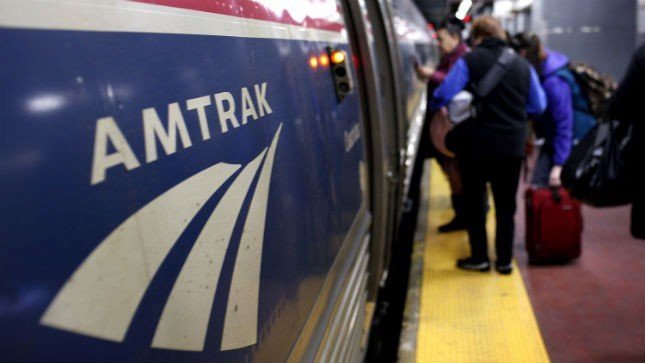
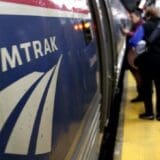

As a college sophomore in the late ’80s, I didn’t have the benefit of Wikipedia or the Google. Instead, the holy grail of research was a black and yellow study guide called CliffsNotes. These heaven-sent summaries of major literary works were a lot easier to read than the originals.
During one quarter, I took a philosophy class where I was assigned to write an essay on Plato’s The Republic. It was springtime in the Bay Area, so the last thing I wanted to do was write the essay. After a visit to the campus bookstore, I devised a strategy to quickly complete my assignment: Summarize the CliffsNotes, and then tack on some class lecture notes. I thought my plan was foolproof — until the professor returned my essay a couple of weeks later. In bright red, he marked comments up and down the margins and in between paragraphs,
» Read more about: Railcar Investment & Jobs: A Teachable Moment »

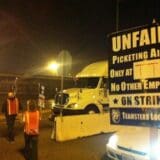
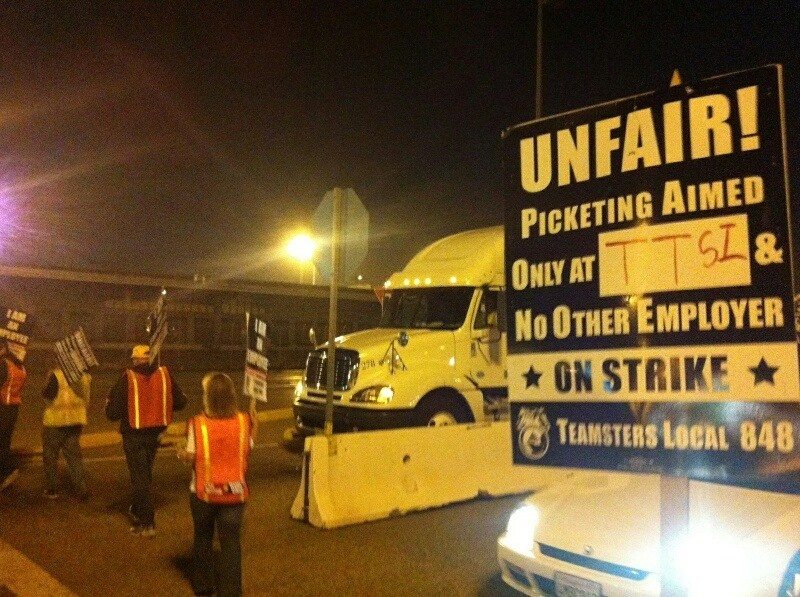
The 48-hour strike by harbor truck drivers ended at dawn today. The haulers have returned to work after drawing an unprecedented amount of public attention to their cause – and without facing dismissals or other forms of retaliation from the three companies they targeted. Those firms — Pacific 9 Transportation, Total Transportation Services, Inc. and Green Fleet Systems – stood accused by the drivers of misclassifying them as “independent contractors,” even as a growing body of labor court rulings shows that the truckers are company employees. As such, they should be entitled to overtime wages, workers compensation, disability and an array of other benefits.
By being placed in the limbo of contractor status, however, the drivers are responsible for all their trucks’ upkeep, fuel and insurance. As a result, like the vast majority of American truckers, port drivers in Los Angeles and Long Beach must subsist on poverty wages.
Some of the drivers joined the work stoppage,
» Read more about: Port Truckers End Strike, Return to Work Without Retaliation »
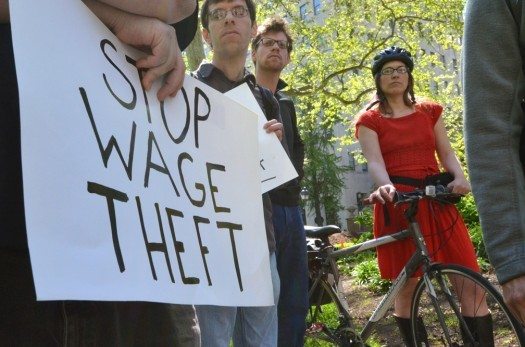
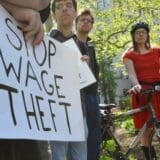

The gaudy evidence of income inequality is all around us: stratospheric CEO “wages,” private plane shuttles to Coachella, gated enclaves and all the rest. But few things say “class war” more eloquently than wage theft, the practice by unscrupulous businesses of short-changing their employees by undercounting work hours or shaving off time for breaks that were never taken.
Wage theft is probably about a minute older than ancient history’s first labor handshake and partly exists because most workers who suffer it are too financially insecure to complain. Now, however, there is increasing pushback from some city and state governments, and from workers themselves –McDonald’s low-wage employees have filed class action lawsuits in several states to recover wages they allege were gouged from their paychecks.
In California, Assembly Bill 2416 (“California Wage Theft Prevention Act”), introduced by Mark Stone (D-Monterey Bay), seeks to curb wage theft by allowing workers to file liens against the real and business property of employers they claim owe them wages.
» Read more about: Lien In: New California Bill Seeks to Curb Wage Theft »
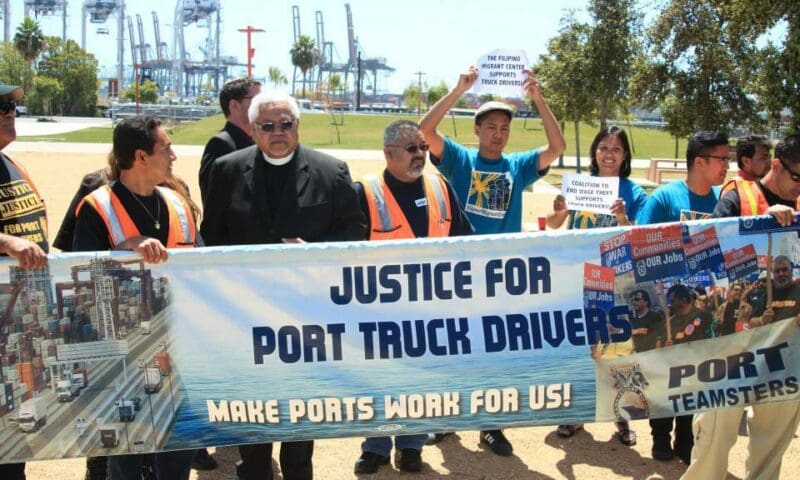
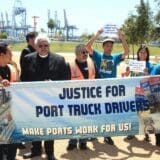
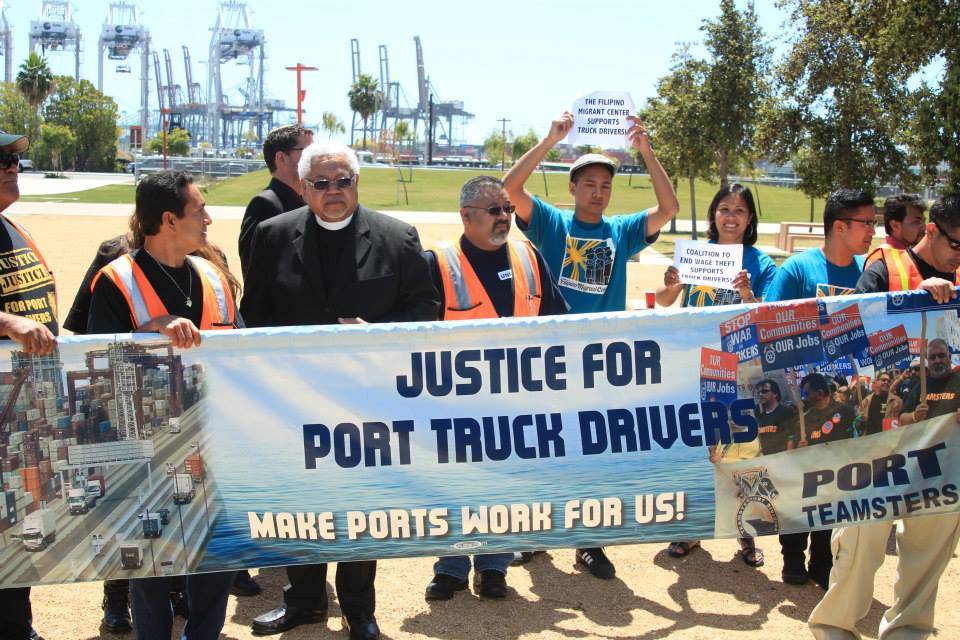
Port truck drivers today continued a 48-hour strike to press their demand to be treated as employees of trucking companies rather than as independent contractors. The distinction is crucial to thousands of drivers who service the nation’s largest port complex, including the more than 100 strikers who drive short hauls for Pacific 9 Transportation, Total Transportation Services, Inc. and Green Fleet Systems. Currently misclassified by the companies as private contractors, these drivers, like the majority of U.S. port truck drivers, are denied overtime wages, workers compensation, disability and a host of other benefits, and must pay for the fuel and maintenance of their vehicles. Furthermore, after paycheck deductions many drivers earn poverty wages despite working long hours during six-day weeks.
At a noontime media event held in Wilmington Waterfront Park, TTSI driver Dennis Martinez told a crowd that “We had to strike because they didn’t want to listen. They didn’t want to deal with us.”
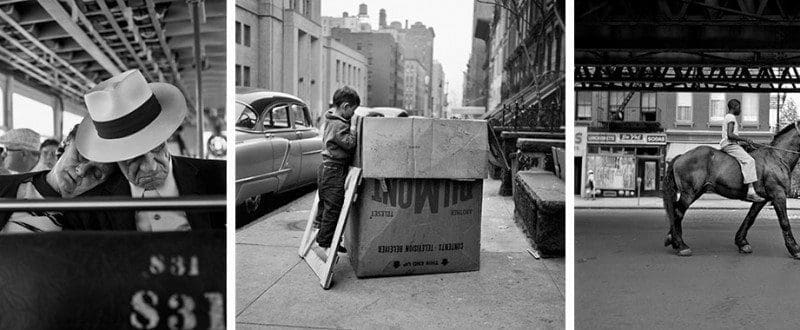
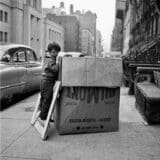
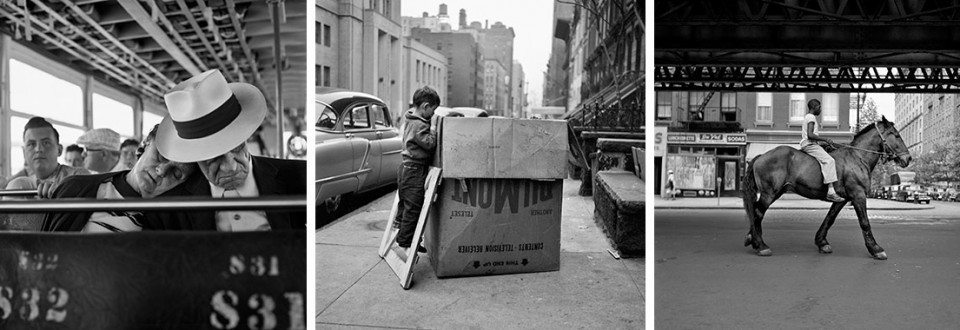
Photographer Vivian Maier spent her last months on a park bench overlooking Lake Michigan, her secret life boxed up in storage units around Chicago. Her tens of thousands of negatives, 16mm films and voice recordings (not to mention newspaper clippings, receipts, unopened IRS refunds, blouses and hats) could easily have disappeared into obscurity if it weren’t for a young real estate agent and amateur local historian, John Maloof, who has a penchant for auctions and flea markets.
If you enjoy photography and the unpredictability of human existence you’ll enjoy Maloof’s film, Finding Vivian Maier. The documentary describes an eclectic journey to unearth the life and motivations of an eccentric subject, an artist who never sought to have her pictures displayed or published.
Maier seemed to have trouble making close human connections, but with her camera she was uncanny in creating intimacy with the widely diverse life on the streets of Chicago and New York.

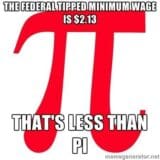
 Are zero-dollar pay stubs and sub-minimum wages really what keep the restaurant industry afloat? That’s what one powerful lobbying group would have us believe.
Are zero-dollar pay stubs and sub-minimum wages really what keep the restaurant industry afloat? That’s what one powerful lobbying group would have us believe.
Taylor Lee can tell you the real impact of minimum wages for tipped workers. Taylor is a 23-year-old restaurant server working in Berkeley, California. Like two-thirds of tipped workers, she is a woman. In California, the minimum wage is currently $8 per hour, whether you get tips or not. This is the amount that Taylor’s employer pays her, “but with tips, if it’s really slow, I make $12 per hour,” she says. “My average wage is about $18-20 per hour.”
From 2006 to 2013, Taylor worked as a server at restaurants in Florida. The minimum wage in Florida is $7.93, but the minimum wage for tipped workers is $4.91. She worked at a Japanese restaurant as a server. If she didn’t get enough tips to make it to $7.93 per hour,



The years-long fight of Los Angeles Port truck drivers to be recognized as company employees– instead of “independent contractors” who lack workplace rights and protections – burst into a 48-hour strike this morning. The work stoppage by drivers for four major trucking firms is organized by Justice for Port Drivers and is targeting the marine container terminals at the twin ports of Los Angeles and Long Beach.
Despite winning a string of labor court rulings in wage theft lawsuits, the drivers say they are still misclassified as independent contractors. That misclassification has meant that drivers are denied overtime wages, workers compensation, disability and a host of other benefits, and must pay for the fuel and maintenance of their vehicles. It has also guaranteed that after paycheck deductions, many drivers who work long hours during six-day weeks earn poverty wages.
This is the second strike in six months by drivers,
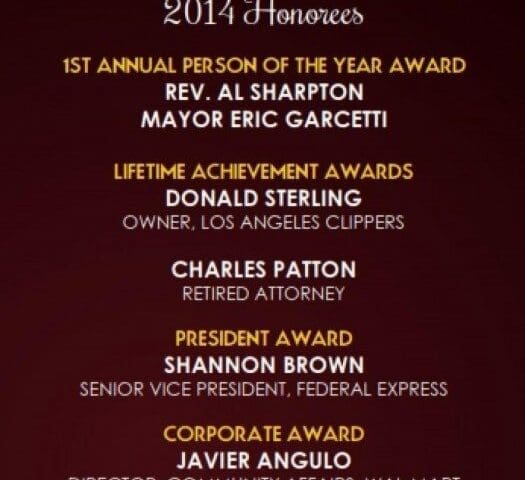
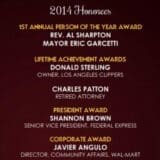
In an excruciating example of bad timing, the Los Angeles chapter of the NAACP was scheduled to bestow its Lifetime Achievement Award to Donald Sterling, owner of the Los Angeles Clippers basketball team, at its May 15 banquet. Sterling is now under fire for racist comments caught on a recording that surfaced on the TMZ website. Even President Barack Obama weighed in, condemning Sterling’s remarks as “incredibly offensive.” The NBA is now investigating Sterling’s remarks and could invoke sanctions, including removing him as Clippers’ owner.
Embarrassed by the controversy, the NAACP announced Sunday morning, via Twitter, that is was withdrawing the award, which was to be presented at the Millennium Biltmore Hotel in Los Angeles as part of the celebration of the chapter’s 100th anniversary. The NAACP also plans to honor Rev. Al Sharpton and Los Angeles Mayor Eric Garcetti — as well as Walmart’s local charity and political operative and a top Fed Ex executive —


It’s been a long, dark road for America’s port truck drivers, but finally there’s a light at the end of the tunnel. After nearly 30 years of ruthless exploitation by the trucking industry, the drivers who transport the goods that fuel our consumer economy may be poised to rejoin the country’s middle class, thanks to an important determination by a regional office of the National Labor Relations Board.
Last month, the NLRB’s Los Angeles office announced the settlement of a casebrought by truck drivers against Pacific 9 Transportation Inc. The drivers alleged that the company had illegally used threats and intimidation to prevent them from exercising their right to form a union, a practice that is rampant across the country thanks to our lax labor laws.
But here’s where it gets interesting. Pac 9’s drivers are considered independent contractors by the company and, according to labor law, independent contractors —
» Read more about: America’s Sweatshops on Wheels Find a Light at the End of the Tunnel »



After years of neglect, the minimum wage has suddenly become a major national issue. President Obama has proposed an increase in the federal minimum to $10.10 an hour, fast food workers are agitating for $15, and candidates who back a higher wage floor, including an avowed socialistin Seattle, are winning local elections. In February, the retailer Gap Inc. announced that it was implementing a nationwide minimum wage for 65,000 of its own 90,000 employees (although only $9 an hour).
The minimum wage is an important issue in other countries as well, although we rarely hear about these cases.
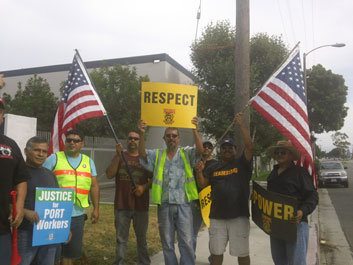
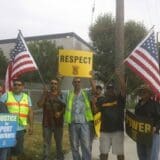

Almost 50 years ago, Bob Dylan recorded with an electric guitar and band for the first time and produced Subterranean Homesick Blues, a culture-altering event that claimed, among other things, that, “you don’t need a weatherman to know which way the wind blows.” That song signaled a cultural change that resonated with forward-looking people of the time, but the truth was ignored or dismissed by those who preferred to look back. Similarly, this is a moment when the wind is blowing strongly in the direction of justice, and those who ignore it risk being left behind.
In previous articles, we have highlighted the prevalent fiction of “independent contracting,” a deception that affects the 12,000 port truck drivers who dray goods out of the Ports of Los Angeles and Long Beach, among the 75,000 drivers nationwide. Drivers in the current system must pay a lease on a truck,
» Read more about: Port Drivers’ Misclassification Homesick Blues »



Energy efficiency is the Swiss Army Knife of public policy. It’s Veg-o-matic. It slices and dices. No matter the question, energy efficiency just might be the answer.
What technology saves you money on your utility bill? How can businesses become more competitive? What reduces greenhouse gas emissions at the lowest cost? Energy efficiency is the correct answer to all-of-the-above.
Now add another benefit: energy efficiency can help prepare us for climate change.
Think about the hot summer days when electricity use skyrockets. On L.A.’s hottest day on record – 113° Fahrenheit on September 27, 2010 – LADWP delivered a whopping 6,177 megawatts. It was the all-time high in power demand, mainly to power air-conditioners and refrigerators.
But, when the grid is overtaxed, there’s also a high likelihood of power outages. More than an inconvenience, blackouts are a public health problem. During the Chicago heat wave of 1995,
» Read more about: It Slices, It Dices – the Magic of Energy Efficiency »



There has been no shortage of ink spilled on the so-called “sharing economy”. To cut through the rhetoric, LAANE’s Jon Zerolnick spoke with Tom Slee, an Ontario-based writer whose work on the intersection of technology, politics, and economics has appeared in The Literary Review of Canada, The New Inquiry, The Guardian, and Jacobin.
 Let’s start with some definitions. What is the sharing economy?
Let’s start with some definitions. What is the sharing economy?
The sharing economy is internet platforms, and more-or-less independent people exchanging real-world goods and services through those platforms. This doesn’t necessarily have anything to do with sharing, but that is the name now.
Some of these platforms started off non-commercial. I’m thinking of things like Couch Surfing, where individuals host each other in their own homes, with no money exchanged; it was a non-profit and provided a coordination service.
» Read more about: Couch Surfers and Billionaires: On the Sharing Economy »
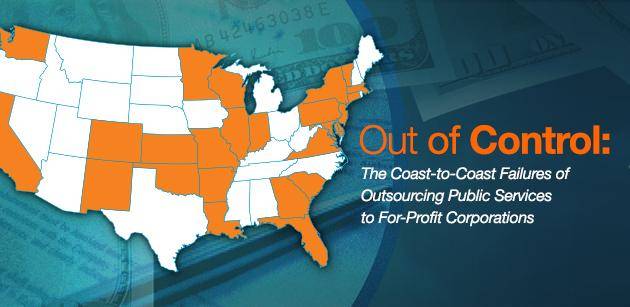
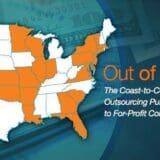

What if we had no government services and everything we used to get from government was run by private corporations? McDonald’s could be running the welfare system, Target the public schools and Walmart our mass transportation networks. What would be wrong with that?
According to Donald Cohen, director of the nonprofit research and action group In the Public Interest, there’s a long list of problems we face when private companies take over government services. For one, it’s hard to find out how much money is being paid to the company’s employees and corporate heads. And, once a formerly public system is taken over by a private company, there’s often no way that voters can set standards for those salaries, the quality of the work done or the cost of services to the public. Right now if you don’t like McDonald’s corporate policies, you can pick another restaurant.



Earth Day is the birthday of the modern environmental movement in the U.S. and across the globe. Today, on this 44th Earth Day, the City of Los Angeles – the second largest in the nation and a mighty economic engine on the West Coast—celebrates its commitment to environmental protections and sustainability with a model Zero Waste ordinance just signed into law by Mayor Eric Garcetti. The days when the city sent three to four million tons of trash to landfills every year from apartment and commercial buildings are ending. Now, Los Angeles is set to achieve the highest recycling rates and best standards of environmental protection from the greenhouse gas emissions, air and groundwater pollution, and loss of recyclable material resources associated with our waste management.
Landfilling or burning millions of tons of trash subjects our residents and our environment to a distressing assault. Landfills and poorly regulated facilities disproportionately impact low income communities of color—as these communities are either employed or housed in close proximity,
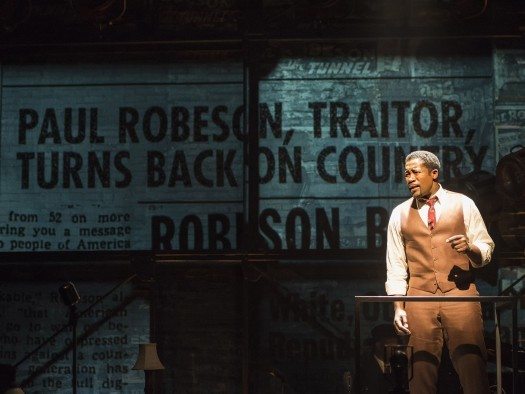
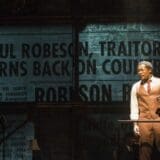

You’ve heard him sing Ol’ Man River, but you may not know his name or that he was a left-wing activist. As mentioned in the program notes for the one-man show The Tallest Tree in the Forest, now playing at the Mark Taper Theater, “the most extraordinary thing about Paul Robeson’s life is that more people don’t know about it.”
For that we can thank the House Un-American Activities Committee that questioned Robeson’s loyalty and effectively destroyed his career, along with the careers of hundreds of other American radicals of the 1940s and 50s. And what a career it was. The son of a father born into slavery, Robeson excelled in collegiate sports and academics and, after earning a law degree from Columbia University, joined the Harlem Renaissance and became a brilliant stage and music performer. Robeson developed a worldwide following with his powerful renditions of Negro spirituals and later with his performance of Othello in New York,
» Read more about: The Tallest Tree in the Forest: Appreciating Paul Robeson »



Springtime is typically emblematic of the birth and growth of new life forms. However, in 2014 this time of year could become a moment of death for the labor movement as we have come to know it. In the coming weeks the United States Supreme Court will render a decision in the case of Harris v. Quinn that could paralyze labor’s ability to organize workers throughout the country. Despite its major implications, the case remains largely absent from our mainstream discourse or even within discussions among progressive allies.
Harris v. Quinn comes out of years of successful organizing by the Service Employees International Union to win collective bargaining rights for thousands of home health and child care workers in Illinois. In 2009, Democratic Governor Pat Quinn signed an executive order to grant home care workers the right to unionize.
The main plaintiff in the case,


 A quarter of all working Americans have no savings, and half die with less than $10,000 in financial assets. Nevertheless, some of us will have a small nest egg, and where to put that bit of money can be a challenge. Even for many socially minded people what we know we’ve learned from “talking to Chuck.” But there are alternatives and they matter.
A quarter of all working Americans have no savings, and half die with less than $10,000 in financial assets. Nevertheless, some of us will have a small nest egg, and where to put that bit of money can be a challenge. Even for many socially minded people what we know we’ve learned from “talking to Chuck.” But there are alternatives and they matter.
I first became aware of other ways to think about investments when I realized my denomination’s retirement fund screens its portfolio for tobacco, alcohol, gambling and guns. Many other faith communities with substantial funds do also. There are also a number of public mutual funds that have significant track records in screening for social responsibility issues. Some invest in alternative energy. Some avoid military contractors. Some look for environmentally enhancing product lines. Others invest in locally owned small businesses or in organic food sources. And some do a combination of all those.
» Read more about: Finance the Future By Investing in Change »



Nina Revoyr is the author of four acclaimed novels, including Southland, The Age of Dreaming and Wingshooters. She is also executive vice president of Children’s Institute in Los Angeles and has taught at Pitzer and Occidental colleges, and at Antioch and Cornell universities. Revoyr will be this year’s keynote speaker at the Los Angeles Alliance for a New Economy’s Women for a New Los Angeles Luncheon on May 9. We recently spoke to her about her work and Los Angeles’ place in it.
[divider]
Your first novel, A Necessary Hunger, dealt with two young girls on the cusp of adulthood. What are the particular challenges young people of color face growing up in Los Angeles today?
» Read more about: Trauma and Vision: An Interview With Novelist Nina Revoyr »



Vocation of the Chair
It longs to be the one
who holds you, keeps you
from falling, its curved legs
shapely as a bride.
The chair that would be saint.
martyr, acolyte. Your little
sins of omission and false pride
cannot sway it — the chair believes
in you. It grows taller in the dark.
Soon it will fill the room,
its cushion of praise all you need
in the crude and faithless light.
[divider]
Laurel Ann Bogen is the author of 10 books of poetry and short fiction. In 2016, Red Hen Press will publish All of the Above: New and Selected Poems 1975-2015. From 1996 until 2002 she was literary curator at the Los Angeles County Museum of Art.